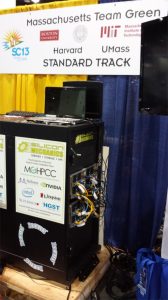
Story by Helen Hill for MGHPCC
Supercomputing 2013 (SC13), the international conference for high performance computing, networking, storage and analysis, took place in Denver CO, November 17-22, 2013.
The Student Cluster Competition is a staple of SC conferences. In this real-time, non-stop, 48-hour challenge, teams of undergraduate and/or high school students assemble a small cluster on the exhibit floor and race to demonstrate the greatest sustained performance across a series of applications. Fueled by a lot of coffee, and very little sleep, this frenetic supercomputing trail by fire gives students a taste of the spotlight.
This year’s competition application areas included WRF (weather research and forecasting), a mesocale numerical weather prediction system; NEMO5, a multipurpose, multiscale, highly parallelized nanodevice simulation tool; GraphLab, a parallel computation abstraction tailored to machine learning; and a “mystery application,” only revealed at the event. This year's special challenge was a Flying Snakes CFD Simulation from MGHPCC seed fund alumna Lorena Barba.
There are two flavors of competition: The Standard Cluster Track, and new in 2013, the Commodity Cluster Track.
In the Standard Track, teams of six students partner with vendors to design and build a cutting-edge cluster from commercially available components that does not exceed a 26-amp power limit, and work with application experts to tune and run the competition codes.
Among the 8 teams selected was a team representing the Massachusetts Green High Performance Computing Center (MGHPCC). The team variously known as Team Mass Green or "Team Chowdah" included students from MGHPCC university partners BU, Harvard, MIT, UMass, and Northeastern.

In the Commodity Cluster track, teams of five students are restricted to use commercially available hardware not exceeding a $2500 USD retail price limit and a 15-amp power limit.
Of the four teams competing in this category Team Bentley NEU, which combined the talents of three students from Bentley University, Waltham, with two from Northeastern University, Boston, made a great showing earning first place. Kudos to all involved.
Captions: (Upper) Members of team Bentley NEU David Yates (left) and Conner Charlebois (right); (Lower) The winning computer – Images credit: David Yates
Supercomputing 2013
Student Cluster Competition, SC13